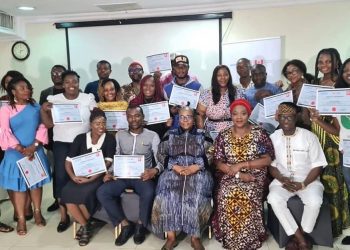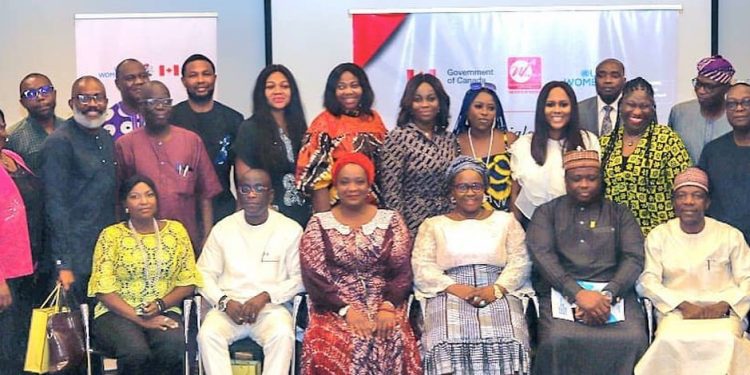Media analysis of the coverage and reportage of women in politics over the years has shown the poor representation of women in politics, whereby many female politicians have been discriminated against or negatively valued under stereotypes in media coverage and have been given a secondary role compared to male politicians.
For instance, the media monitoring exercise conducted by the International Press Centre (IPC) in 2015 which monitored 30 national newspapers between November 2014 and March 2015 showed that out of 13,449 politician sources quoted in the newspapers, 12,777 (95%) were men while 672 (5%) were women.
Prior to the 2019 general election, another media monitoring exercise was conducted by the IPC and the trend of gender reporting in 2018/2019 wasn’t remarkably different from that of 2014/2015 based on the findings of the performance scorecard in relation to women.
Findings show that men dominated the media space with 1,417 mentions, representing (50.61%). Women on the other hand got 102 mentions (at 3.54%), Youths got 109 mentions (at 3.7%) while Persons with Disabilities got 33 mentions (at 1.14%).
With an understanding of the vital role of the media and changing the negative narrative about women in politics, the UN Women in collaboration with the Women Radio Centre with support from the Government of Canada, set up different initiatives to drive gender-responsive and sensitive reporting, especially in regards to political coverage.
The activities which involved engagement with media professionals at the Executive and reportage level were aimed at addressing any form of editorial policies, ownership biases, and capacity gaps that could hinder gender-sensitive reportage of women in politics. Thus, a National Dialogue with Media Executives and Gender-Sensitive training for Reporters were organized by the duo of UN Women and Women Radio Centre.
The Need for Gender-Sensitive Political Reportage – UN Women Country Rep
The UN Women Country Representative to Nigeria and ECOWAS, Beatrice Eyong while speaking to the media professionals explained that women’s participation in politics and representation in power has been consistently marred by underrepresentation, and there have only been a marginal increase in the number of women representatives in elective and appointive positions between 1999 to date.
Eyong, who noted that Nigeria has produced the best quality of women with expertise leading in different capacities across the world, wondered why the qualities are not recognized and harnessed in the country.
She noted that the call for gender equality seems to be frustrated because of the wrong misconceptions about gender equality, stressing that “gender equality does not mean women become men and men become men; wives become recalcitrant to their husbands; women topple men in their positions, neither does it seek to belittle men.”
The UN Women Country rep emphasised that it is high time women began to emerge into leadership positions because “with more women in government, there will be an increased budgetry allocation for key sectors that affect women, there will be policy decisions and law that will positively affect them, abolishment of harmful traditional practices that affect women among others.”
She noted that “if we do nothing as media professionals to positively report women in politics, there would be higher maternal and child mortality rate, harmful traditional practices persist, lower GDP, unfavourable policies and laws, abject poverty, increased violence against women and girls.”
She thereafter charged the media to rally their support for women who are contesting different political positions.
Eliminating the Gaps through 50:50 Coverage – Toun-Okewale Sonaiya
Toun Okewale-Sonaiya, the CEO of Women Radio 91.7 believes that there needs to be an intentional and deliberate attempt by the media, to bridge the gap in the representation and coverage of women.
Introducing the 50:50 project being implemented by the BBC, Okewale-Sonaiya mentioned that the aim is to imbibe the practice of producing 50:50 media content that portrays women and men in a fair, accurate, and balanced way.
Okewale-Sonaiya who reemphasized and decried the poor representation of women in the media noted that the 50:50 project would help to address the huge gaps.
She appealed to media executives and reporters to give prominence to women’s issues, beyond what they are currently doing.
The WFM CEO who noted that there are females with expertise in diverse fields who can be meaningfully engaged in the media said “women should be featured on the front page, women should begin to appear on popular programmes instead of just men, women’s pictures should be used when talking about them and not the pictures of their husbands.”
She thereafter noted that the challenge of getting female experts as usually mentioned by the media is being addressed as WFM and its partners are collating databases of female experts, which would be made available to journalists.
Media Executives, Journalists Commit to Promote Women in Politics
The Media Executives, drawn from Broadcast, Print, and Online platforms, after being engaged at the National Dialogue have committed to promoting women in politics in their respective media outlets. The journalists who were engaged separately have also exhibited commitments to promote women in their reportage.
Specifically, the media executives committed to include women’s issues on major topics, and pages and also give ‘free’ airtime/page to promote women in politics.
There was also a pledge to intensify efforts in reporting issues affecting marginalized women groups and engage them to address issues affecting them to bring about social change.
The journalists who mentioned that their editors are some of the gridlocks that prevent them from gender-sensitive reportage believed that the engagement with media executives would help to change the narrative to a very large extent.

Recommendations to Media Stakeholders
Towards ensuring that the commitments and pledges to promote women in politics made by the media professionals, media experts, and UN executive shared key recommendations at the dialogue and training sessions.
Gender and Media Strategist, Madam Ene Ede said it is important that media professionals carry out their obligations in a just manner and understand their role as the biggest ally of women while they raise awareness on gender equality to address certain myths and misconceptions about women in leadership.
She believes there is a need to review the code of ethics, laws, and policies guiding journalism practice to ensure women are promoted in the media.
On his part, Dr Oluseyi Soremekun, National Information Officer, United Nations Information Centre (UNIC) buttressed the need for journalists to avoid stereotypical comments and generalizations in their reports.
He mentioned that journalists needed to take extra effort to do more research about women and ensure they are fairly represented in their reports.
Also, Mrs. Motunrayo Alaka, the Executive Director of the Wole Soyinka Centre for Investigative Journalism (WSCIJ) while speaking to the journalists about the RUSH Model which she designed, mentioned the need for journalists to engage in nuanced reporting until something happens.

